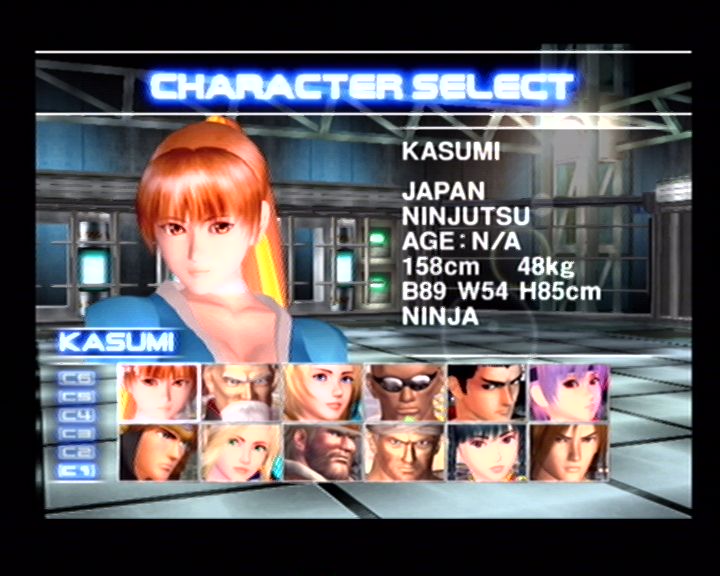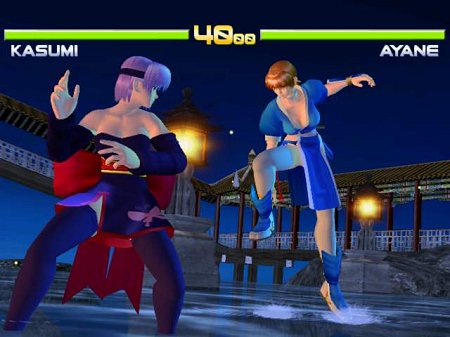Dead
or Alive 2

STORY:
A great leader was killed at the end
of the 20th century. His name was Fame Douglas, and he was renowned as the
sponsor of the legendary Dead or Alive World Combat Championship. Since his
death, and in the absence of his charisma and leadership, the world has become
chaotic. Yet something appears to be transpiring. Amid this chaos, it is
announced that the "Dead or Alive Championship 2" will be held. However, Douglas's passing has taken with it the purpose and significance of the
tournament. Even worse, the promoter of "Dead or Alive Championship
2", who is fond of conflicts and jealous of the string, is responsible for
Douglas's death. The new promoter is more than a corrupt mastermind, but a man
of pure evil. His involvement in the tournament has brought a sense of terror to
the world, resulting in the infamous Tengu disaster that occurred at the end of
the 20th century. The climax of the disaster is about to begin with a roaring
battle.
|

|
|
Dead
or Alive 2 Character Selection Screen
|
REVIEW: Dead
or Alive 2 was originally released on October 19th, 1999 in Japan arcades,
running on Sega's NAOMI arcade system. The arcade version features 12 playable
characters, with Story Mode and Time Attack available. Survival
mode and Tag Battle can also
be unlocked with a code using the arcade version's service menu. An update to the arcade version
entitled DOA2: Millennium was later released in January 2000, making
Survival and Tag mode available from the start and adding new school uniforms
for Kasumi and Ayane. This would be the last arcade installment of DOA
until the release of DOA5: Ultimate, thirteen years later.
Tecmo and Team Ninja's second installment
to DOA brings forward an innovative step
in the 3D fighting genre (one that would later become one of the defining
aspects of the series) - "Multi-tiered" stages. Arguably the main draw of
DOA2
is the fact that the fighters have the ability to
knock each other off of high areas / platforms, or slam their opponent straight through a guardrail
or wall, only to continue fighting on a lower level. Although it's completely
unrealistic for a human to survive such a fall and continue fighting like nothing happened, the
focus on stage interaction and multi-tiered
stages distinguishes DOA2's gameplay, offering flash and excitement that
other fighting games don't have. From
smooth character models to impressively detailed backgrounds, DOA2's
polished graphics engine also provides plenty of next-gen eye candy. And yes,
the humorously and impressively overly-exaggerated "bouncy boobs" effect has returned from the
first game. One can't say it's not entertaining.  I can respect a healthy looking female! Nothing wrong with that.
I can respect a healthy looking female! Nothing wrong with that.
|

|
|
Tina
Armstrong with a juggle and wall hit.
|
Team Ninja fleshed out DOA's character designs
visually and evolved their original movesets quite a lot from the original game.
The console version of DOA2 adds Story Mode into the mix, which can be summed up as a handful of
short (and sometimes awkward)
cutscenes. While the DOA cast is certainly a "shiny" group of
people, their personalities still leave much to be desired.
To put it bluntly, the girls of DOA seem to be
more interested in showing off their hot bods and sexy outfits than fighting. (Was this game
designed by men with one-tracked minds? Probably.)  | |
All of the fighters of DOA
have fairly nicely-animated fighting styles and movesets with depth. DOA2's
roster only comes up slightly short when compared to some other 3D fighters out
there. In my personal opinion, TEKKEN
Tag Tournament's character variety and movesets keep me entertained and
playing for longer (many years longer) and if I had to choose... well,
I'd stay with TEKKEN. However, I can enjoy both games as an experienced
3D fighting game player. It's not hard! Just learn how to sidestep. A small
annoyance for me? Several of the featured martial arts styles of DOA2 aren't represented
as well as they could be (and many fan-favorite martial arts styles are sorely
missing from the series all together).
|

|
|
The
stunt fall money shot!
|
DOA2's
gameplay in general is respectively solid,
whether you're comparing it to other 3D fighting games or good ol' classic 2D
fighting games. The in-game action also
flows noticeably smoothly (perhaps even a little too smoothly at times), offering a
very unique and eye-catching visual experience. Returning from DOA1, the
famed Counter System has returned — providing a surefire way to
counter a kick or punch with a flashy reversal attack. It only requires a basic
fundamental level of timing, so even a novice player should be able to pull off
Counter techniques with ease. On that note, from a competitive standpoint I'd say the counter
system is a bit overly easy. There are High Counters and Low
Counters, so if you're not attacking or throwing, you're probably countering
your opponents attacks! There are just too many moves that are easily countered,
so it makes for a frustrating and eventually repetitive gameplay experience...
but if you're into it, enjoy it for what it is!
I played quite a bit
of DOA2... and I'd go as far as to say DOA2 almost teaches poor
3D fighting game
fundamentals, simply because counters in most other 3D (and 2D) fighting games
require more precise inputs and timing — perhaps coming off as "too difficult" for players
only familiar with DOA
mechanics. Counters are easy in DOA, simply put. The Counter techniques
themselves do look pretty cool however, especially since
each character has his or her own unique hard-hitting throw or counter-strike techniques. There are
also some cool combo possibilities
in DOA2, but when counters can be used at any time and so frequently, the actual
gameplay becomes a bit monotonous and overly dependant on countering... in my
experience, anyway.
|

|
|
Behind you
Ayane! ...Kasumi is creepin' on ya.
|
In the Dreamcast version of DOA2 (released Feb. 29th, 2000), players can fight 1-on-1
via Story Mode or try out the entertaining Tag Battle
Mode which allows for 2-on-2 tag team fighting (enabling some ultra cool tag
team throws). The Dreamcast version also introduces Team Battle, Sparring, and also features a surprisingly addicting Survival
Mode. About a month later, DOA2 was released on March 30th, 2000 as a
launch title for PlayStation 2 in Japan. The Japanese PS2 version adds 3 new
stages (Crimson, Koku An and Prairie) along with some new unlockable costumes.
Unfortunately, the PS2 version was inferior to the Dreamcast version due to
lower resolution, more aliasing, and bugs / freezing issues within Versus mode. DOA2
was eventually succeeded by the sequel, DOA2: Hardcore.
|
|

| Page Updated: |
September
11th, 2025 |
| Developer(s): |
Team Ninja |
| Publisher(s): |
Tecmo |
| Designer(s): |
Tomonobu Itagaki |
| Platform(s): |
Arcade,
Dreamcast, PS2 (As DOA2 - Hardcore)
|
| Release Date(s): |
Oct.
19th, 1999  Arcade Arcade
January 2000  Arcade - DOA2: Millennium update Arcade - DOA2: Millennium update
Feb. 29th, 2000
 Dreamcast Dreamcast
Mar. 30th, 2000  PS2 PS2
July 14th, 2000  Dreamcast Dreamcast
Sept. 28th, 2000  Dreamcast Dreamcast |
| Characters: |
Kasumi, Ayane,
Ein,
Leon,
Lei
Fang,
Tina Armstrong,
Bass Armstrong, Zack,
Hayabusa,
Helena, Gen
Fu, Jann Lee, Tengu
|
|
|
|
Featured Video:
|
|
|
| Related Games: |
Dead or Alive 2: Hardcore,
Dead
or Alive, Dead
or Alive 3, Dead or Alive 4, Dead
or Alive 5, Dead or Alive 5: Ultimate, Dead
or Alive: Dimensions,
Dead or Alive 6,
Last Bronx, Virtua Fighter 3, Soul
Calibur,
Soul Calibur 2, TEKKEN Tag Tournament,
TEKKEN 4 |
|

|
|
Gameplay
Engine
|
8.0 / 10
|
|
Story
/ Theme
|
6.0 / 10
|
|
Overall
Graphics
|
9.5 / 10
|
|
Animation
|
9.5 / 10
|
|
Music
/ Sound Effects
|
7.0 / 10
|
|
Innovation
|
8.0 / 10
|
|
Art Direction
|
7.0 / 10
|
|
Customization
|
7.0 / 10
|
|
Options / Extras
|
6.5 / 10
|
|
Intro / Presentation
|
8.0 / 10
|
|
Replayability / Fun
|
8.0 / 10
|
|
"Ouch" Factor
|
9.0 / 10
|
|
Characters
|
7.0 / 10
|
|
BOTTOM LINE
|
8.3
/
10
|
|
Review based on Dreamcast
version
|
|
| Final
Words: |
I played the original DOA1 at arcades for only a short while, but I
unexpectedly fell in love with the Dreamcast version
of
DOA2. (I originally rented the game and quickly decided I needed to add this
one to my permanent Dreamcast fighting game collection.)  1999-2000 was good times for us 3D fighting game lovers. DOA2's Survival mode
in particular was a really fun single-player experience (especially when you got
really good with a character and could destroy the AI competition). Also, this
game's tag-team throws never seem to get old!
1999-2000 was good times for us 3D fighting game lovers. DOA2's Survival mode
in particular was a really fun single-player experience (especially when you got
really good with a character and could destroy the AI competition). Also, this
game's tag-team throws never seem to get old!
While Dead or Alive 2 wasn't the most technically sound
fighting game out there in 1999-2000, it was one of the better ones... and definitely a unique and an
entertaining next-gen 3D fighter for its heyday. The counter and combo system offered
intuitive gameplay that any 3D fighting game player can easily get into. The cool stage designs in particular
were one of the most defining aspects of the game, in my eyes.
Overlooking some of the unrefined and annoying gameplay / balance quirks, DOA2's animation quality was top stuff for the
time... especially
the stage transitions and collision animations that bring the always-appreciated
ouch factor. The variety of cool tag-team throws
are also quite satisfying to discover, which vary depending on your specific
team of characters. A cool level of detail that makes the roster feel whole! I remember trying to get some of my TEKKEN and SoulCalibur friends into DOA2 on the Dreamcast
— and we had fun playing it for a while (although our local arcade didn't have the game).
While DOA2 has its
strengths, the somewhat small character roster feels a bit lonely. Also, the overall "weird" artistic vibe
and soft aesthetic of the
game lead to my eventual boredom with the title. If the dev-team put more
emphasis on authentic martial arts and more likeable (male and female) character designs, DOA2
might've retained my interest for a much longer period of time. At the end of the day, DOA2
is a fun
and accessible 3D fighter for its time — and probably one of the coolest
singular installments of the series. DOA2:
Hardcore was a nice surprise and decent upgrade to the title, as well.
~TFG Webmaster |
@Fighters_Gen
|
|
|
|
|
|
|
|
|
|
|
|
|